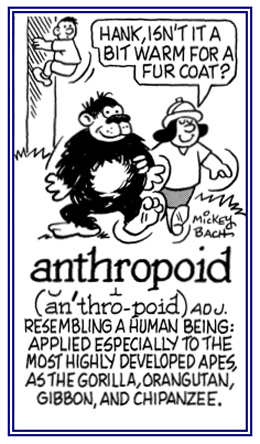anthrop-, anthropo-, -anthrope, -anthropic, -anthropical, -anthropically, -anthropism, -anthropist, -anthropoid, -anthropus, -anthropy
(Greek: man, mankind; human beings; including, males (man, men; boy, boys) and females (woman, women; girl, girls); all members of the human race; people, humanity)
anthropogeographic (adjective), more anthropogeographic, most anthropogeographic
1. A reference to the branch of studies regarding the world's distribution of humans based on physical characteristics, languages, customs, and institutions.
2. That department of earthly studies that specializes in the various aspects of the environment as related to mankind.
2. That department of earthly studies that specializes in the various aspects of the environment as related to mankind.
A branch of human studies that deals with the world's distribution of people based on their physical characteristics, languages, customs, and institutions: Greg read about anthropogeography as the worldwide distribution of human types by their cultural traits and by their ethnic and racial characteristics.
Any animal that has a tongue like that of a human; such as, a parrot.
The origin of the human species or the investigation and account of this beginning: Many other factors are involved in anthropogony besides biological evolution, including climatic, geographic, ecological, social, and cultural ones.
The branch of human science that deals with the physical features of this world's distribution of the races of mankind and their local variations: Anthropography is based on the physical characteristics, language, customs, and the society or organization of human types by cultural traits.
Creatures that resemble or like people: Gorillas, apes, monkeys and other similar animals are considered to be anthropoids.
anthropoid (adjective), more anthropoid, most anthropoid
Resembling or having the characteristics of a person; used especially to refer to the human-like apes, including chimpanzees, gorillas, and many ancient apes: Harry's brother looked more anthropoid than an actual man because of his size and unusually hairy body.

© ALL rights are reserved.
Go to this Word A Day Revisited Index

Go to this Word A Day Revisited Index
so you can see more of Mickey Bach's cartoons.
anthropoidal (adjective), more anthropoidal, most anthropoidal
1. A reference to the form of a person, man-like.
2. Characterized by being shaped like a creature that is human in form only: There are anthropoidal apes and robots.
2. Characterized by being shaped like a creature that is human in form only: There are anthropoidal apes and robots.
Anthropoidea (pl) (noun)
A suborder of primates characterized by well-developed brains and walking in an upright position: Anthropoidea include human beings (family "Hominidae"); as well as, monkeys and apes.
The Anthropoidea are distinguished from the lower primates, which include lemurs (arboreal primates with pointed noses and typically a long tail, found only in Madagascar), lorises (small, slow-moving nocturnal primates with short or absent tails) living in dense vegetation in South Asia) and tarsiers (small insectivorous, tree-dwelling, nocturnal primate with large eyes, a long tufted tail, and long hind limbs, native to the islands of Southeast Asia).
The study of the total human being in action, with integrated applications from the special fields of the biological and physical sciences, psychology, and sociology.
1. The worship of mankind; the giving of divine honors to a human being.
2. The worship of a human being as a god.
3. The cult of a god conceived as in human form.
2. The worship of a human being as a god.
3. The cult of a god conceived as in human form.
The petrified human remains or a fossil ascribed to the human species: The anthropolites of some people's skeletons, or parts of them, have been discovered by some archeologists during their excavations of historical sites.
A fossilized human skeleton.
anthropolithic (adjective), more anthropolithic, most anthropolithic
A reference to preserved remains or traces of human skeletons or bones from the remote past.
anthropolitic (adjective), more anthropolitic, most anthropolitic
Descriptive of a human body, or portion of it, that has become converted into stone or a stony substance.


